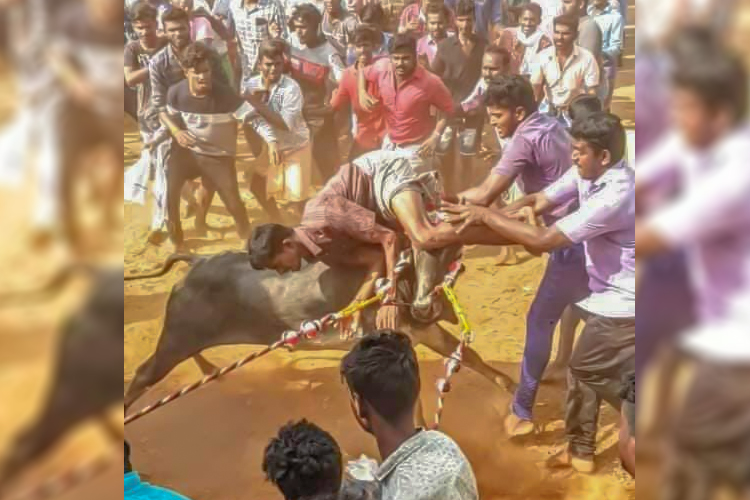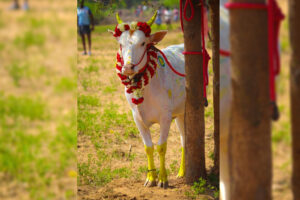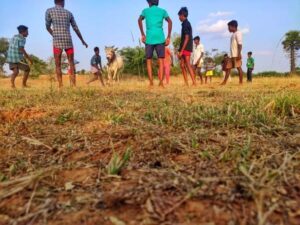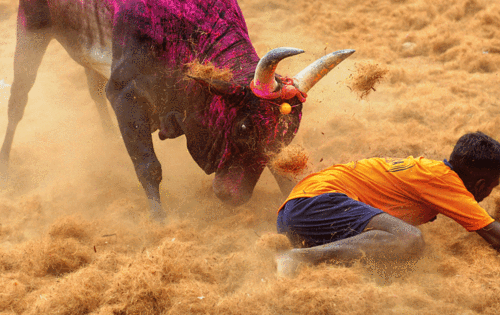Pongal: Bull training in full swing for Jallikattu

Participants try to pounce on a running bull and try to hold on to its hump or horn and move along with the bull without falling (Photo: Sathish)
With less than a week to go for Pongal, bull owners and tamers are now almost at the peak of their training, with regular practice sessions to ensure that they are well prepared for Jallikattu this season.
Jallikattu is one of the most traditional and controversial sports played as part of Pongal celebration and it is observed on Mattu Pongal day, the second day of the three-day Pongal festival. During this period, every street in Tamil Nadu is well-decorated and locals and tourists head to the villages to catch a glimpse of Jallikattu.
The bull trainers train their bulls for over a month before Pongal, through an intensive process where the bulls are trained to swim so that they can gain more strength as well as for their activeness. During this period, the bulls are also especially well fed and the trainers take several precautions to keep their bulls strong and healthy.
“We have four Jallikattu bulls, so we train all of them together for one month before the event. During the first week of training, we only provide them rice husk mixed in water and a few more things. After a few days, we give them eggs and other rich food. Twice a day in a week, we also take them for swimming so that they can stay highly active and perform well. This continues throughout the training period,” Sathish, a resident of Mandaiyur village, in Pudukkottai district, Tamil Nadu tells Media India Group.
“At first, we get to know the process on how to handle the bull without any fear and we have to be friendly with them and develop a bond with them. Only after that they trust us and cooperate with us during the training. Then it becomes easier for us to control them and to catch them by their horns and the hump,” says Sathish, who is studying engineering.
During the training, a process called mann kuthal also takes place in which bulls are trained to develop their skills by digging their horns in the wet earth and also trained to attack when someone tries to catch their hump.
In the early days of this sport, Jallikattu also became an occasion where women of the village could choose their husbands whom they find to be the bravest of the lot and who managed to tame the bulls. Now, though, it has transformed more into a challenge sport where the young and even not so young prove themselves by grappling with the bulls.
Hundreds of men chase the bulls and try to hold their horns and hump, struggling with the toughened bulls that have been raised wild, fed well and also trained intensively to make them sturdy and fit for the fight at the event.
“Before the event, we train bulls on the ground where players also participate and train themselves for the final day. When a group of people tries to control the bull, it gets angry and it starts running and attacks them. Twice a day for a week they conduct these practice sessions to prepare the animals as well as humans for the final day of the competition,” says Sathish.
Three days before the event, tokens are given to the tamers as well as for the participating bulls. A proper medical checkup is conducted where the weight and overall fitness of the participants as well for the bulls is checked. “The process of registration of the bulls begins three days before the event. The person who is willing to participate in the sport is given a proper medical checkup and weight, age is also checked,” says Sathish.
He says that for the tamers, the period of training is crucial to ensure that while the bulls are properly fed, they should not be overeating. “The bull should not put on any weight during training for the event or else it would not be able to run during Jallikattu. One day before the event, bulls are taken for swimming and they are decorated for the next day. Their food intake is also reduced before the event,” says Sathish.
For the safety of the participants, the sharp horns of some of the bulls are blunted.
Day of reckoning
The day of Jallikattu event varies from district to district but most important is the week of Pongal. Due to Covid-19 restrictions and as per the state government’s order, in 2022 Jallikattu, the number of players cannot be more than 150 at the event and Covid-19 negative certificate is made mandatory for all the players. The number of viewers has also been restricted to 50 pc of the gathering this year.
The main objective of the sport is that the participants should pounce on a running bull and they should try to hold on to its hump or horn and move along with the bull without falling. The person who wins in every round and plays till the last round is considered to be the winner.
“The event starts at around 8 am in the morning and continues till 5pm at the evening. Jallikattu is really a risky game as while trying to subdue a running bull, many times we fall under the bull’s legs and get injured. When the bull is released in the middle of the crowd, a group of people tries to control it with bare hands and people try to hold on to the bull by grabbing its hump and try to tire it out and defeat it,” says Sathish Kumar, who works as a web designer in Pudukkottai tells Media India Group.
Animal lovers oppose Jallikattu
Though it is a highly awaited sport for many in Tamil Nadu, over the recent past it has also got its share of detractors who say it is cruel to the animals and many of them, and also some participants, have been hurt or even killed during the competition.
In 2014, the Supreme Court (SC) banned Jallikattu after a plea was filed by the Animal Welfare Board of India and the People for the Ethical Treatment of Animals (PETA). As the order attracted massive protests in the state, the Tamil Nadu government insisted that Jallikattu was a crucial part of the state’s culture and identity and it amended the law to by-pass the top court’s order and the ban was lifted in January 2017.
The participants say that they have now improved the medical attention to ensure that the injuries are minimised and animals are properly treated before, during and after the event.
“Every year, a medical team and a team of veterinarians stays in the event with an ambulance to give aid to the person if anyone gets injured during the event,” says Kumar, adding, it requires a proper training and a quick reflex to catch the bull, adding that he has been participating in the event for the past two years.












